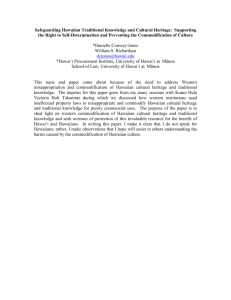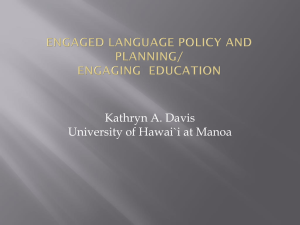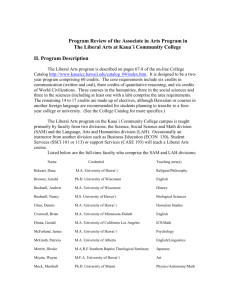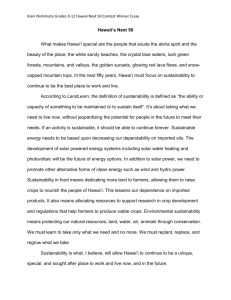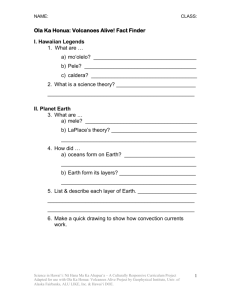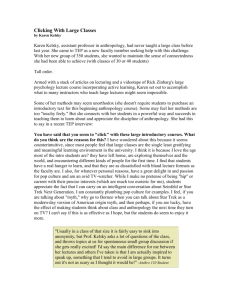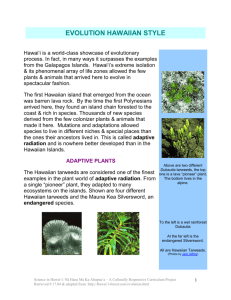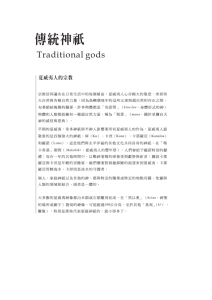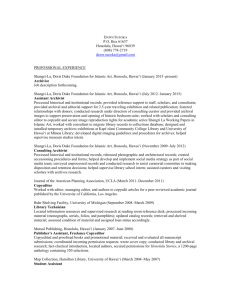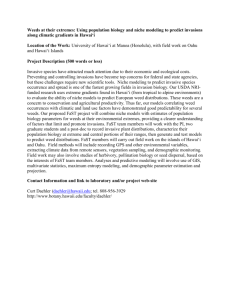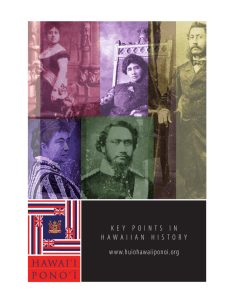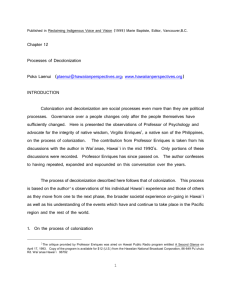My Bibliography on Gay Rights & Same-Sex
advertisement
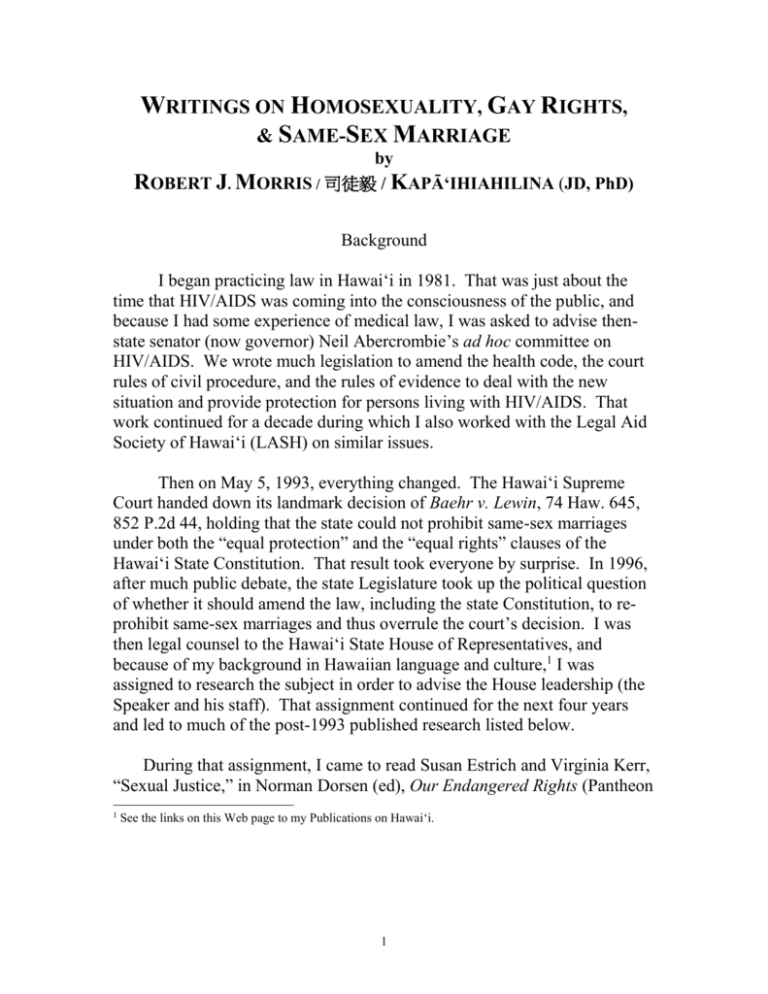
WRITINGS ON HOMOSEXUALITY, GAY RIGHTS, & SAME-SEX MARRIAGE by ROBERT J. MORRIS / 司徒毅 / KAPĀ‘IHIAHILINA (JD, PhD) Background I began practicing law in Hawai‘i in 1981. That was just about the time that HIV/AIDS was coming into the consciousness of the public, and because I had some experience of medical law, I was asked to advise thenstate senator (now governor) Neil Abercrombie’s ad hoc committee on HIV/AIDS. We wrote much legislation to amend the health code, the court rules of civil procedure, and the rules of evidence to deal with the new situation and provide protection for persons living with HIV/AIDS. That work continued for a decade during which I also worked with the Legal Aid Society of Hawai‘i (LASH) on similar issues. Then on May 5, 1993, everything changed. The Hawai‘i Supreme Court handed down its landmark decision of Baehr v. Lewin, 74 Haw. 645, 852 P.2d 44, holding that the state could not prohibit same-sex marriages under both the “equal protection” and the “equal rights” clauses of the Hawai‘i State Constitution. That result took everyone by surprise. In 1996, after much public debate, the state Legislature took up the political question of whether it should amend the law, including the state Constitution, to reprohibit same-sex marriages and thus overrule the court’s decision. I was then legal counsel to the Hawai‘i State House of Representatives, and because of my background in Hawaiian language and culture,1 I was assigned to research the subject in order to advise the House leadership (the Speaker and his staff). That assignment continued for the next four years and led to much of the post-1993 published research listed below. During that assignment, I came to read Susan Estrich and Virginia Kerr, “Sexual Justice,” in Norman Dorsen (ed), Our Endangered Rights (Pantheon 1 See the links on this Web page to my Publications on Hawai‘i. 1 Press, 1984), pp. 98-133. It taught me something I had never before understood: Homophobia, racism, sexism, misogyny, misanthropy, elitism, xenophobia, and all other “phobias” are part of the same thing; they are not separate, compartmentalized phenomena. Often they move in cycles of political and social correctness; when one wanes, others explode. I decided that the guarantees of equality in the Constitution obligated me as a lawyer to oppose them all. By opposing one, I could oppose the others. I had grown up in the days of the American civil rights movement, so this was a natural extension of that work. I also became deeply involved in the First Amendment issues of the separation of church and state.2 As with all areas of civil and human rights, these battles are far from over. As the Chinese proverb states, we must carry forward the cause and open up the future 繼往 開來. Following that assignment, I worked at the Office of Hawaiian Affairs (OHA), specializing in Native Hawaiian rights. Many of the following publications focus specifically on Hawai‘i culture, language, law, and politics. There are many other Hawai‘i-related publications listed at the other links on this Web page (see, e.g., the links My Bibliography on Hawai‘i, The Flexible Definition of “Families,” and My Short Story of Hawai‘i). I encourage research in original Hawaiian-language materials. My debt to the language is apparent. Both life and death reside in the language: i ka ‘ōlelo ke ola, i ka ‘ōlelo ka make. “Long live the grand old, sonorous, poetical Hawaiian language.” —The Rev. Lorenzo Lyons (Makua Laiana), 1878 (author of the anthem, “Hawai‘i Aloha”). I especially love the great Hawaiian story of the ruling chief, Lonoikamakahiki, and his aikāne, the commoner Kapā‘ihiahilina. I urge everyone to read that story. My Hawaiian name is Kapā‘ihiahilina in honor of the story and of them. The version that I rely on is found in both English and Hawaiian in volume 4, part 2, of The Fornander Collection of Hawaiian Antiquities and Folklore. Most big libraries have these or can get them via interlibrary loan. 2 See the link on this Web page to my monograph on constitutional checks-and-balances and the doctrine of the separation-of-powers. 2 Publications 1990 “Aikāne: Accounts Hawaiian Same-Sex Relationships in the Journals of Captain Cook’s Third Voyage (1776-80),” Journal of Homosexuality 19(4): 21-54. 1991 “Trade,” Tribe: An American Gay Journal 1(4): 51-63 (short story). 1992 “Same-Sex Friendships in Hawaiian Lore: Constructing the Canon” in Stephen O. Murray, ed., Oceanic Homosexualities. New York & London: Garland Publishing Co., 71-102. 1994 “Court Bashing in the Legislature: A Modern Lesson in Civics From the ‘Federalist,’” Law Reporter: The Journal of Hawai‘i Trial Lawyers Association 6(6): 5-6. 1995 Book Review of Lilikalā Kame‘eleihiwa, Native Land and Foreign Desires: Pehea Lā e Pono Ai?, Journal of Homosexuality 29(1): 124-35. 1996 “Configuring the Bo(u)nds of Marriage: The Implications of Hawaiian Culture & Values for the Debate About Homogamy,” Yale Journal of Law & the Humanities 8(1): 105-60. 1997 “‘What Though Our Rights Have Been Assailed?’ Mormons, Politics, Same-Sex Marriage, and Cultural Abuse in the Sandwich Islands (Hawai‘i),” Women's Rights Law Reporter 18(2): 129-204. 1998 Special Report: “Framers of Hawai‘i Constitution Did envision Marriage as a Civil Right Unfettered by Sex,” Honolulu Star-Bulletin, Saturday, October 24; online <http://archives.starbulletin.com/98/10/24/editorial/special2.html>. 2000 “Re-Identifying American State Democracy: Implications for SameSex Marriage and the Nonfungibility of Hawai‘i in the ‘Exotic’ 1950 Hawai‘i Statehood Constitution,” University of Hawai‘i Law Review 22(1): 1-17. 3 2005 “Both ‘New’ and ‘Everlasting’: Law and Religion in the Creation of Neo-Mormon Doctrine on (Homo)sexuality” 6 Rutgers Journal of Law & Religion (PDF online): <http://lawandreligion.com/sites/lawandreligion.com/files/Morris.pdf>. 2006 “Translators, Traitors, and Traducers: Perjuring Hawaiian Same-Sex Texts Through Deliberate Mistranslation,” Journal of Homosexuality 51(3): 225-47. January 15, 2012 www.robertjmorris.net 4
